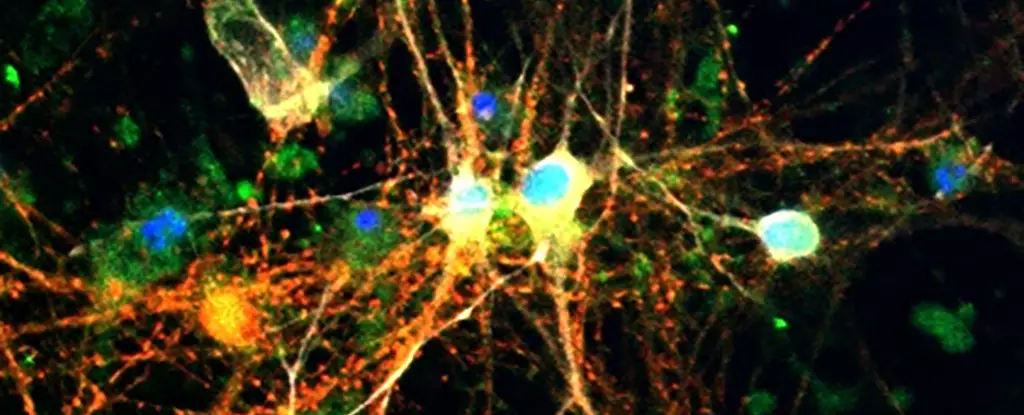For decades, the brain’s energy needs have been primarily attributed to glucose, with a focus on its consumption for sustenance rather than its storage. Traditionally, glycogen—the stored form of glucose—has been viewed as a peripheral energy reserve, backing up muscles and liver during fasting or intense activity. However, mounting evidence suggests that this long-held assumption is incomplete, perhaps dangerously so. Recent breakthroughs imply that glycogen in the brain isn’t just a passive reserve but an active player in neuronal health and disease. This paradigm shift holds profound implications, especially considering devastating conditions like Alzheimer’s disease, which continues to pose a formidable challenge to medicine.
The emerging research indicates that glycogen accumulation within neurons could be intimately linked to neurodegeneration. Previously, scientists debated whether tau protein build-ups were a cause or effect of Alzheimer’s; now, we see that glycogen itself might have a much more direct role, potentially fueling or exacerbating pathological processes. This revelation raises essential questions: Could controlling glycogen levels in the brain slow—or even reverse—the progression of disease? Are glycogen and tau proteins intertwined in a way that defines the very mechanism of neuronal deterioration?
Glycogen’s Unexpected Role in Tauopathies
The connection between glycogen build-up and tauopathies—diseases characterized by abnormal tau protein accumulation—was previously hypothesized but lacked concrete evidence. New findings demonstrate that excessive glycogen exists in models of tau-related neurodegeneration, both in experimental organisms like fruit flies and in human brain tissues affected by Alzheimer’s. Significantly, tau proteins appear to interfere with the normal catabolism of glycogen, trapping it in a form that may be harmful over time. Rather than serving as a harmless energy store, glycogen seems to contribute to a toxic environment within neurons.
This confluence of tau and glycogen overload creates a feedback loop: tau impairs glycogen breakdown, leading to its accumulation, which in turn fosters conditions conducive to further tau aggregation. Such a vicious cycle could explain why the pathology of neurodegenerative diseases worsens over time. If glycogen accumulation hampers neuronal resilience, then targeting this process could open new therapeutic avenues.
Modulating Glycogen Breakdown to Protect Brain Cells
One of the most promising insights from this research hinges on the enzyme glycogen phosphorylase (GlyP), which catalyzes the breakdown of glycogen into usable glucose. When scientists increased GlyP activity in fruit fly models of tauopathy, they observed a reduction in glycogen reserves, less neuronal damage, and an extension in lifespan. This suggests that enabling neurons to efficiently utilize glycogen can mitigate some of the destructive consequences associated with neurodegeneration.
Moreover, dietary interventions highlighted the importance of metabolism in neuroprotection. Low-protein diets—already linked with better cognitive health—appeared to upregulate GlyP activity naturally, offering a metabolic strategy to counteract glycogen accumulation and tau pathology. Such findings underscore a crucial point: metabolic flexibility, driven by nutrition or pharmacology, could serve as a potent means to maintain neuronal integrity.
Advancing this concept, researchers developed pharmacological agents that mimic the effects of dietary restriction by activating pathways involved in glycogen metabolism. The use of 8-Br-cAMP, for instance, mirrored dietary benefits and reduced neurodegenerative markers in experimental models. The potential connection to GLP-1 receptor agonists like Ozempic, predominantly used for diabetes management, further underscores the therapeutic promise—these drugs may do more than regulate blood sugar; they might also interrupt damaging metabolic processes within neurons, offering a new frontier in dementia care.
Beyond Traditional Views: Toward a New Therapeutic Horizon
This burgeoning understanding challenges the conventional wisdom of brain energy metabolism, suggesting that glycogen management could be pivotal in combating age-related neurodegeneration. If we can harness the molecular pathways that regulate glycogen storage and utilization, we might develop targeted therapies capable of preventing or even reversing key aspects of diseases like Alzheimer’s.
The implications extend beyond pharmacology; lifestyle and dietary modifications could become part of precision medicine strategies to stave off cognitive decline. As the research deepens, a more nuanced picture emerges—one where brain glycogen is not merely an energy backup but a central component of neuronal health, with the potential to be manipulated for therapeutic benefit.
The traditional perspective of brain glucose metabolism is shifting dramatically. By critically examining and transforming our understanding of glycogen’s role in neurodegeneration, we unlock the possibility of revolutionary treatments that address the disease process at its core—an empowering step toward healthier aging and cognitive resilience.

